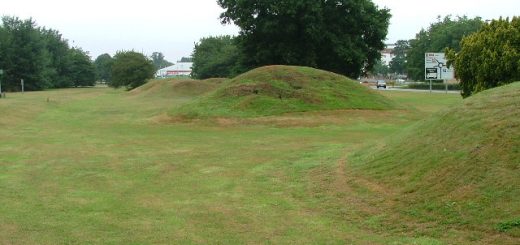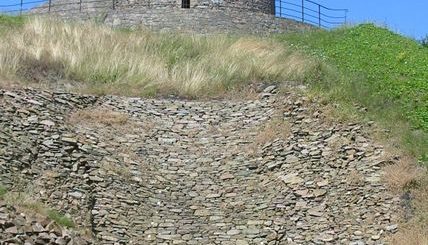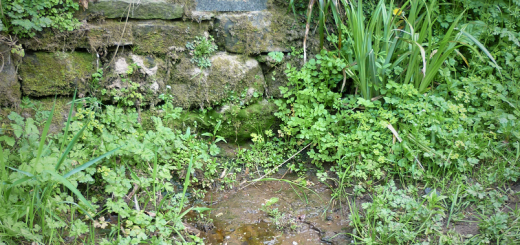The Wise Woman Of Littondale
The following legend of ‘The Wise Woman Of Littondale’ appeared in ‘The Table Book’ (1827) by William Hone (Born 3 June 1780 – Died 8 November 1842) and partially reprinted in ‘Yorkshire Legends and Traditions’ by Rev Thomas Parkinson (1888).
In the year 17 — , in a lonely gill not far from Arncliffe, stood a solitary cottage. A more wretched habitation the imagination! cannot picture. It contained a single apartment, inhabited by an old woman called Bertha, who was throughout the valley accounted a wise woman, and a practiser of the ** art that none may name. I was at that time very young, and unmarried; and, far from having any dread of her, would frequently talk to her, and was always glad when she called at my father’s house. She was tall, thin, and haggard; Her eyes were large, and sunk deep in their sockets; and the hoarse masculine intonaions of her voice were anything but pleasing. The reason I took such delight in the company of Bertha was this — she was possessed of much historical knowledge, and elated events which had occurred two or three centuries ago, in a manner so minute and particular, that many a time I have been induced to believe she had been a spectatress of what she was relating. Bertha was undoubtedly of great age; but what hat age was no one ever knew. I have frequently interrogated her on the subject, but always received an evasive answer to any inquiries.
In the autumn, or rather in the latter end of the summer, of 17 — , I set out one evening to visit the cottage of the wise woman. I had never beheld the interior, and, led on by curiosity and mischief, was determined to see it. Having arrived at the cottage, I knocked at the gate.
“Come in,” said a voice which I knew to be Bertha’s.
‘I entered. The old woman was seated on a three-legged stool by a turf fire, surrounded by three black cats and an old sheep-dog.
“Well,” she exclaimed, “what brings you here? What can have induced you to pay a visit to old Bertha?”
‘I answered : “Be not offended. I have never before this evening viewed the interior of your cottage, and, wishing to do so, have made this visit. I wished, also, to see you perform some of your incantations.”
‘I pronounced the last word ironically, and Bertha observed it, and said:
“Then you doubt my power, think me an impostor, and consider my incantations mere jugglery. You may think otherwise. But sit down by my humble hearth, and in less than half an hour you shall see such an instance of my power as I have never hitherto allowed mortal to witness.”
‘I obeyed, and approached the fire. I now gazed around me, and minutely viewed the apartment. Three stools, an old deal table and a few pans, three pictures of Merlin, Nostradamus, and Michael Scott, a cauldron and a sack, with the contents of which I was unacquainted, formed the whole stock of Bertha.
‘The witch, having sat by me a few minutes, rose and said:
“Now for our incantations. Behold me, but interrupt me not”
‘She then with chalk drew a circle on the floor, and in the midst of it placed a chafing dish filled with burning embers. On this she fixed the cauldron, which she had half filled with water. She then commanded me to take my station at the further end of the circle, which I did accordingly. Bertha then opened the sack, and, taking from it various ingredients, threw them into the ” charmed pot.” Amongst other articles I noticed a skeleton head, bones of different sizes, and dried carcasses of some small animals. While thus employed she continued muttering some words in an unknown language; all I remember hearing was the word konig. At length the water boiled, and the witch, presenting me with a glass told me to look through it at the cauldron. I did so and beheld a figure enveloped in the steam. At the first glance I knew not what to make of it ; but I soon recognised the face of N , a friend and intimate acquaintance. He was dressed in his usual mode but seemed unwell and pale. I was astonished, and trembled. The figure having disappeared, Bertha removed the cauldron and extinguished the fire.
“Now,” said she, “do you doubt my power? I have brought before you the form of a person who is some miles from this place: was there any deception in the appearance ? I am no impostor, though you have hitherto regarded me as such.”
‘She ceased speaking. I hurried to the door, and said, “Good-night, Bertha.”
“Stop,” said she ; “I have not done with you. I will show you something more wonderful than the appearance of this evening. Tomorrow, at midnight, go and stand upon Arncliffe Bridge, and look at the water on the left side of it. Nothing will harm you; fear not.”
“And why should I go to Arncliffe Bridge? What end can be answered by it? The place is lonely; I dread to be there at such an hour. May I have a companion?”
“No.”
“Why not.”
“Because the charm will be broken.”
“What charm?”
“I cannot tell.”
“You will not?”
“I will not give you any further information. Obey me; nothing shall harm you.”
“Well, Bertha,” I said, “you shall be obeyed. I believe you would do me no injury. I will repair to Arncliflfe Bridge tomorrow at midnight. Good-night.”
I then left the cottage and returned home. When I retired to rest I could not sleep — slumber fled my pillow — and with restless eyes I lay ruminating upon the strange occurrences at the cottage, and on what I was to behold on Arncliffe Bridge. Morning dawned. I arose unrefreshed and fatigued. During the day I was unable to attend to my business; my coming adventure entirely engrossed my mind.
Night arrived. I repaired to the bridge. Never shall I forget the scene. It was a lovely night. The full-orbed moon was sailing peacefully through a clear blue, cloudless sky, and its beams, like streaks of silvery lustre, were dancing on the waters of the Skirfare; and the moonlight falling on the hills, formed them into a variety of fantastic shapes. Here one might behold the semblance of a ruined abbey, with towers and spires and Anglo-Saxon and Gothic arches; at another place there seemed a castle frowning in feudal grandeur, with its buttresses, battlements, and parapets. The stillness which reigned around, broken only by the murmuring of the stream, the cottages scattered here and there along its banks, and the woods wearing an autumnal tinge, all united to compose a scene of calm and perfect beauty. I leaned against the left battlement of the bridge. I waited a quarter of an hour, half an hour, an hour; nothing appeared. I listened: all was silent. I looked around: I saw nothing.
“Surely,” I inwardly ejaculated, “I have mistaken the hour I No; it must be midnight. Bertha has deceived me, fool that I am 1 Why have I obeyed the beldam?”
‘Thus I reasoned. The clock of the neighbouring church chimed; I counted the strokes — it was twelve o’clock. I had mistaken the hour, and resolved to stay a little longer on the bridge. I resumed my station, which I had quitted, and gazed on the stream. The river in that part runs in a clear, still channel, and all its music dies away. As I looked on the stream I heard a low, moaning sound, and perceived the water violently troubled without any apparent cause. The disturbance having continued a few minutes, ceased, and the river became calm, and again flowed on in peacefulness. What could this mean? Whence came that low, moaning sound ? What caused the disturbance of the river? I asked myself these questions again and again, unable to give them any rational answer. With a slight indescribable kind of fear I bent my steps homewards.
‘On turning a corner of the lane that led to my father’s house, a huge dog, apparently of the Newfoundland breed, crossed my path, and looked wistfully on me.
“Poor fellow” I exclaimed, “hast thou lost thy master? Come home with me, and I’ll use thee well till we find him.”
‘The dog followed me, and when I arrived at my place of abode I looked for it, but saw no traces of it, and I conjectured it had found its master.
‘On the following morning I repaired again to the cottage of the witch, and found her, as on the former occasion, seated by the fire.
“Well, Bertha,” I said, ” I have obeyed you, I was yesterday, at midnight, on Arnciiffe Bridge.”
“And of what sight were you a witness”
“I saw nothing except a slight disturbance of the stream.”
“I know,” said she, “that you saw a disturbance of the water; but did you behold nothing more?”
“Nothing.”
“Nothing! Your memory fails you.”
“I forgot, Bertha. As I was proceeding home I met a Newfoundland dog, which I supposed belonged to some traveller.”
“That dog,” answered Bertha, “never belonged to mortal; no human being is his master. The dog you saw was Bargest! You may perhaps have heard of him?”
“I have frequently heard tales of Bargest, but I never credited them. If the legend of my native hills be true, a death may be expected to follow his appearance.”
“You are right, and a death will follow his last night’s appearance.”
“Whose death?”
“Not yours.”
As Bertha refused to make any further communication, I left her. In less than three hours after I quitted her I was informed that my friend N, whose figure I had seen enveloped in the mist of the cauldron, had that morning committed suicide by drowning himself at Arncliffe Bridge, in the very spot where I beheld the disturbance of the stream.’




Recent Comments